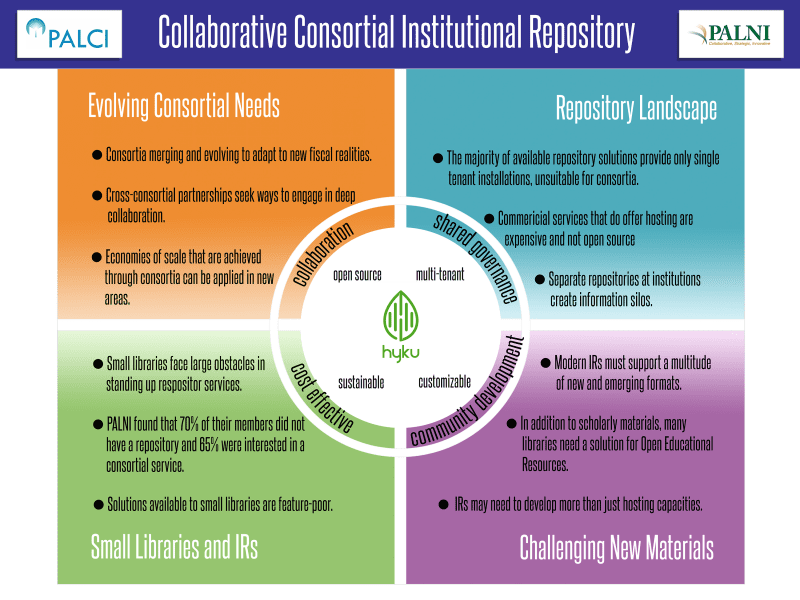Editor’s note: When we changed the 2020 Library Publishing Forum to a virtual conference format, we gave presenters the option of converting their presentations into blog posts. This is a guest post in that series.
By Gretchen Gueguen and Amanda Hurford

Introduction
Partnering consortia, PALNI (the Private Academic Library Network of Indiana) and PALCI (the Pennsylvania Academic Library Consortium) are collaborating on a new initiative to produce an affordable, open-source, collaborative institutional repository (IR) solution based on the Hyku software. By creating a shared platform, the two consortia hope to create a flexible and responsive repository service — one they can manage collaboratively in order to respond to both longstanding and emerging IR needs presented by their constituents.
Supporting Library Publishing
Consortia offering a low cost IR platform option to their partner libraries open doors for those with shrinking budgets and staff. This project intends to better enable consortially supported libraries to participate in library publishing of open educational resources (OER), electronic theses and dissertations (ETD), and present the potential for institutions to further grow their own tailored local publishing programs.
Hyku for Consortia
Hyku offers an collaborative IR solution that is:
- Open source
- Multi-tenant
- Sustainable
- Customizable
Hyku for Consortia, a project supported by an IMLS National Leadership Grant for Libraries, allows us to further develop, test, and evaluate the existing Hyku product in order to move toward a production-ready service. Notch 8, a web development firm with substantial Hyku expertise and a leader of and major contributor to the Samvera community, has been identified as the project’s lead application developer. Many of the considerations driving the direction of this project involve evolving consortial needs, the repository landscape, challenging new materials, and interest in/obstacles blocking libraries obtaining their own IR.
Evolving Consortial Needs
- Library consortia have been around for a long time, primarily created as a response to rising serials prices
- Recently many consortial groups have evolved their mission to take advantage of other economies of scale
- One area of development is in the hosting of repositories, but available solutions don’t meet consortial needs.
Repository Landscape
- Our libraries want an alternative to expensive hosted solutions and recognize that individual repositories create information silos
- The open-source and commercial IR landscape offers few options for a consortially hosted, multi-tenant solution
Challenging New Materials
- Many libraries are looking for solutions that handle multiple types of material, both their own digitized collections, as well as scholarly output and institutional records
- Other new formats, like Open Educational Resources, need an infrastructure that can be adapted to their unique needs
Libraries and IRs
- Libraries have a lot of obstacles to offering repository services including cost, management resources, lack of staff expertise, and software without the features they need.
- PALNI found that 70% of their libraries didn’t have an IR and 65% would be interested in a consortium managed resource.
Development Plans
Working with a team of members from PALCI and PALNI libraries defining specifications, our project is developing the software further to manage consortial workflows through things like administrative tools and custom branding and theming features. We are also developing specialized features for OER and ETD resources. In addition to technical developments, we will also be exploring how consortia can work together to share staff resources and infrastructure to create a service that is collaborative, relies on shared governance, is cost-effective, and meets community needs. We are excited to contribute to this platform, and provide a more flexible and responsive IR service model, innovating to support library IR work and publishing today.
You can find out more about our project and keep up to date with developments at: https://www.hykuforconsortia.org/
Gretchen Gueguen
Digital Projects and Communications Manager
PALCI
Amanda Hurford
Scholarly Communications Director
PALNI
